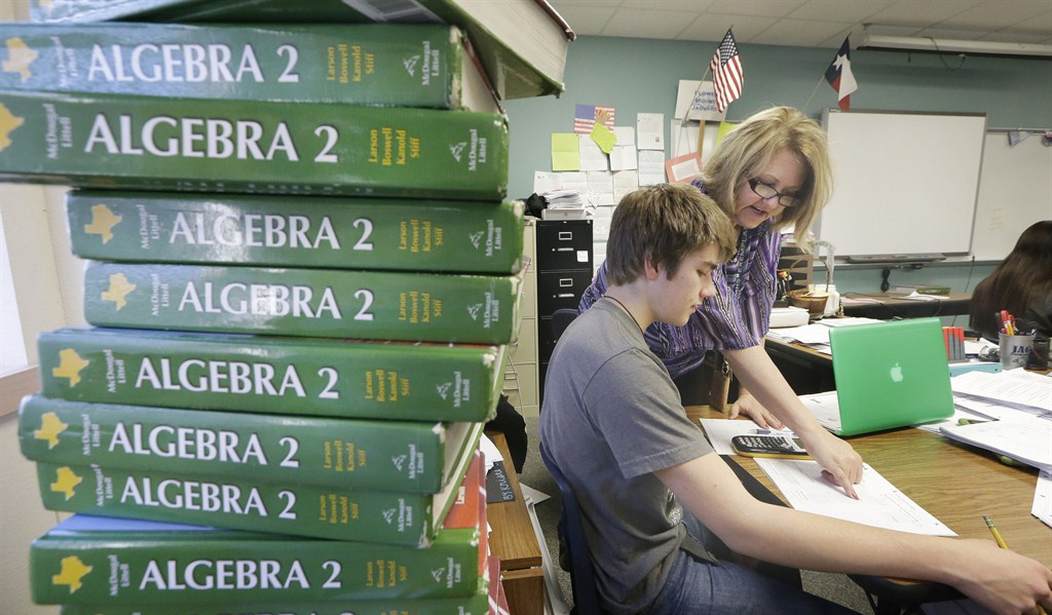This may sound like a strange thing for people to get worked up about but the story of algebra in San Francisco is another case of progressives making rules based on equity concerns which wind up helping no one and hurting some people. The facts here are pretty clear. Here’s how the Washington Post framed the San Francisco effort back in 2021:
In 2014, the district overhauled its curriculum to group all students with a mix of abilities through 10th grade. Almost everyone is taught Algebra 1 in ninth grade and geometry in 10th. Students who want to take AP Calculus their senior year may accelerate, for instance by combining Algebra 2 and precalculus in 11th grade.
The district was looking to unravel the pervasive classroom racial segregation that came with tracking and rethinking the best way to teach, said Lizzy Hull Barnes, mathematics and computer science supervisor for the district. The result, she said, is that “more students enrolled in advanced math courses, and it’s a more diverse group of students.”
The buzzword was “detracking.” Detracking was supposed to benefit minority students who were consistently behind white and Asian students on standardized math tests.
Advocates for the new California math guidelines say “de-tracking,” or mixing together students of varying academic performance, can help all students, particularly those who would have languished in lower-level classes. It can also unravel racial segregation inside schools. Almost everywhere, White and Asian American students are more likely to be placed in higher tracks, with Black and Latino students more likely to be placed in lower tracks.
What all of this boiled down to was an effort to force everyone to take Algebra together in 9th grade rather than allowing some advanced students to take it in 8th grade. Detracking would have obvious downsides. In most cases, it would make it difficult for students to reach calculus before college, which mattered because many advanced math students across the country will have already had a full year of calculus before arriving at college. But all of this was considered of secondary importance to the real goal which was closing the racial achievement gap. If a few math nerds had to be sacrificed on the altar of equity, so be it.
But having misdiagnosed the problem it shouldn’t be a surprise that detracking did absolutely nothing to close the achievement gap. More than 18 months ago, an education policy analyst Tom Loveless concluded that despite SFUSD’s claims the program was a success, it was actually a failure. Because the program had been in place since 2014, he was able to directly compare students from before the change to those afterwards.
As displayed in Table 1, SFUSD’s scores for 11th grade mathematics remained flat from 2015 (scale score of 2611) to 2019 (scale score of 2610), moving only a single point. Table 1 shows the breakdown by racial and ethnic groups. Black students made a small gain (+2), Hispanic scores declined (-14), white students gained (+17), and Asian students registered the largest gains (+22).
In short, the achievement gap not only didn’t close, it got slightly worse. Subsequent evaluations of San Francisco’s efforts reached the same conclusion.
A much-debated change to math course sequencing in the San Francisco schools designed to reduce racial inequities has increased Black students’ access to some higher-level courses.
But racial inequities at the most advanced levels of high school math remain largely unchanged, according to a new analysis released March 20…
“Closing those racial and ethnic gaps in advanced math coursetaking was a central stated goal of this reform. And it seems pretty clear that in that regard, it failed on its own terms,” Dee said.
Yesterday, a group of moderates who call themselves the SF Guardians rallied to bring algebra back to the city’s Middle Schools. It’s part of an effort by city supervisors to get the issue on the ballot and force the school board’s hand in reversing this failed policy.
The Board of Supervisors’ Rules Committee voted unanimously to move forward with a ballot measure urging the San Francisco Unified School District to make first-year algebra available to middle school students by the eighth grade. The next step is for the entire board to vote on the issue on Tuesday, and most members are likely to support the statement…
“I was really shocked when I learned that San Francisco public schools don’t offer algebra until ninth grade and that the workarounds for it are so difficult and so hard,” said Autumn Looijen, an organizer of SF Guardians, an activist group created during the recall elections, told The Standard.
“I have a kid who took algebra in sixth grade down the peninsula, and we also have a kid who went through the standard math pathways here, including doubling up in his junior year,” Looijen added. “It was tough, you know. That’s a lot of math to learn in a short period of time during your junior year when you’ve got so many challenging classes going on.”
There’s no telling how things are going to turn out in San Francisco but this is the same group that helped recall three members of the school board (and don’t forget the recall of DA Chesa Boudin). Even in one of America’s bluest cities progressive errors don’t have to be left in place forever.








Join the conversation as a VIP Member